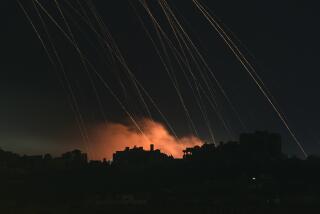ARABESQUES<i> by Anton Shammas; translated from the Hebrew by Vivian Eden (Perennial Library / Harper & Row: $8.95) </i>
- Share via
When first released in Israel in 1986, this novel was greeted by the Israeli periodical Al-Hamishar as “the first truly Israeli novel, based entirely on the Israeli experience.” Significantly, Anton Shammas, while very definitely Israeli, is not Jewish: He is a Christian Arab.
“Arabesques” is the partly autobiographical story of the wanderings of Shammas’ own family. The narrative begins with the author’s grandfather, Jubran, who leaves his native southern Syria to settle in the Galileean village of Fassuta in the 1850s. One son will leave the Middle East and die a pauper’s death in Argentina; Anton’s father dies in Haifa in 1978.
The novel’s most vivid sections are Anton’s childhood memories, his depictions of the customs and manners of his native village. The stories told him by his Uncle Yusef relay anecdotes over the last 75 years.
Politics and conflicting territorial claims between the Israeli Jews and Arabs invariably, though unobtrusively, suggest themselves at times. When Anton describes his own Catholic Arab village, he writes, “Our village is built on the ruins of the Crusader castle of Fassove, which was built on the ruins of Mifshata, the Jewish village that had been settled after the destruction of the Second Temple.”
Writing in these pages, Muhammad Siddiq praised the novel for its “rich and allusive language, pulsating lyricism, subtle humor and invincible irony. . . . (“Arabesques”) is a literary feat in its own right.”
More to Read
Sign up for our Book Club newsletter
Get the latest news, events and more from the Los Angeles Times Book Club, and help us get L.A. reading and talking.
You may occasionally receive promotional content from the Los Angeles Times.









